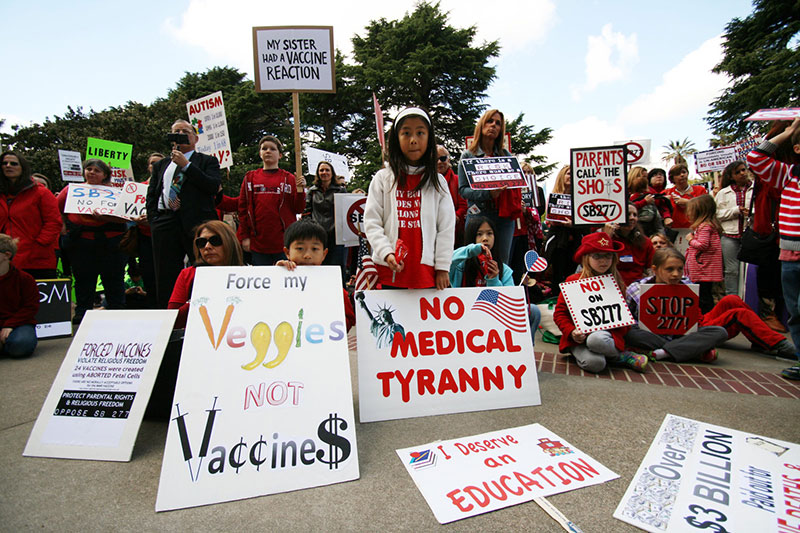
California moved one step closer to strengthening its vaccination requirements after a key state Senate panel passed a bill on Wednesday. However, that action has sparked protests outside the legislature in Sacramento.
According to Tracy Seipel of San Jose Mercury News, Senate Bill 277 would require that children can be admitted to school in California only after being immunized for various diseases, including measles and whooping cough; exemptions related to medical reasons would still be allowed. In addition, the bill would require schools to notify parents about their immunization rates.
"To protect my baby from preventable disease before he could be vaccinated, I needed everyone in my community to be vaccinated, and that is not happening," Leah Russin, a Bay Area mom and leader of Vaccinate California, said.
Seipel reported that the panel passed the bill in a 6-2 vote. The bill will also be heard by three other committees before heading to the Assembly for a vote; Gov. Jerry Brown will decide on whether to sign or veto the bill.
According to a report made by CBS News and the Associated Press, supporters argued that the measure would help increase the number of vaccinated young people and improve public health. One of them included Ariel Loop, whose 4-month-old son contracted measles after visiting Disneyland.
"My infant shouldn't have had to suffer. He shouldn't, still months later, be having complications with his eyes," Loop said. "I shouldn't have had to fear for his life."
Loop added that "dying from something as stupid as a fever or the complications of that in 2015 is just unnecessary."
However, opponents of the bill argued to CBS News and the Associated Press that the bill would trample parental rights. One opponent, Karen Kain, claimed her daughter died from injuries related to vaccines.
"I stand here today before you to share my story so you can all see and hear what happens when vaccines go wrong," Kain said. "Who gets to make the choice now of whose babies are more important? Because there is risk, there must be choice."
SB277 co-sponsor Sen. Ben Allen, D-Santa Monica, explained to Seipel why he signed on to the bill.
"I saw firsthand almost every step of the debilitating impact of this disease," Allen said, referring to his father's fight with polio.
The other co-sponsor of the bill, Sen. Richard Pan, D-Sacramento, told Seipel that exemption rates in some parts of California are as high as 21 percent, which "placed our communities at risk for preventable disease." He argued that the vaccine rules should be tightened thanks to a continued whooping cough epidemic in 2014 and another in 2010 that killed 10 infants.
"Measles had spread through the state and the country in large part because of communities where many people were unvaccinated -- and allowed to remain so by applying for 'personal belief exemptions' -- offered by California and 19 other states," Seipel wrote, citing Pan.
According to Seipel, Dr. Dean Blumberg, a pediatrician who testified on behalf of the American Academy of Pediatrics and the California Medical Association, noted that childhood vaccinations have "been so extraordinarily successful that it is easy to forget the bad outcomes." Both medical organizations threw their support behind the bill.
"Unfortunately, there's much misinformation about vaccine safety and effectiveness," Blumberg said. "Let me be clear: There is no scientific controversy about vaccine safety and vaccine effectiveness. ... This is not open to dispute among mainstream doctors and scientists."
Even Dr. Bob Sears, a pediatrician who Seigel described as having "unorthodox views on childhood vaccinations," conceded that the science is settled when it came to vaccinations. He made those comments back in February to KNX 1070.
"These diseases are equal opportunity infectors, they're gonna infect the rich, the poor, the clean, the dirty," Sears said. "Chicken pox, measles, whooping cough, polio, diphtheria, all these diseases that we no longer see very much of anymore, I do say that the vaccines are responsible for getting rid of these."























